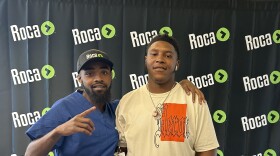Outside of the Delta Community Center in Park Heights, National Night Out is now an annual tradition going back 10 years. The music played, people participated in raffles and sno-cones a-plenty were served in paper cups.
Baltimore City Mayor Brandon Scott touted this year’s reduction in homicides: In July, they were down 25%.
“Baltimore City is doubling the national average in reducing homicides,” said Mayor Scott. “But that's not good enough for me because I want 50%. I told the police commissioner that yesterday, this is about collective work to evolve our city into a safer place.”
The National Night Out is a nationwide event meant to connect police with community members through activities like block parties, game nights, cook-outs and more. Scott emphasized community policing and encouraged Baltimoreans to work with police to reduce crime together. That was a message echoed in Park Heights by Attorney General Anthony Brown and States’ Attorney Ivan Bates.
Community-oriented policing is part of BPD’s mission as per the consent decree between the U.S. Department of Justice and Baltimore City. The decree is a series of mandated reforms in response to past civil rights violations by the Baltimore Police Department and is meant to protect “individuals’ statutory and constitutional rights, treat individuals with dignity and respect, and promote public safety in a manner that is fiscally responsible and responsive to community priorities.”
Not everyone feels like their communities are getting safer. Seneca Jackson lives between Johns Hopkins and Morgan State.

“I never see any police officers. But we have a rampant drug trade and violence constantly on the streets, but nothing happens. So I don't see it in the community,” said Jackson.
Jackson doesn’t think everything should fall on the police though — he wants the community to have hard conversations about the root causes of violence. “We don't talk about mental health in the Black community and coming out of COVID these kids are going to need those kinds of resources.”
Noting the rising gun violence among youth, Jackson thinks some of that responsibility should be on adults who need to be held accountable for the actions of their children. He noted the case of April Gaskins, a grandmother who in July was convicted of reckless endangerment and firearm access by a minor after her grandson used her gun to fatally shoot a teenage girl last year.
“Punishment for parents looks like if your child did something, you got to take the crime if they're underage,” said Jackson. “Yeah, I’m tough on crime.”
Community policing means community responsibility for Shawnte Craig, like how she remembers it from her childhood. “If I got in trouble and my mom's friend saw it or the neighbor saw it, you know, it was okay for the neighbor to provide discipline of some sort or to talk to my parents,” said Craig. “I just really think we need to get back to being focused on community and I think the policing aspect will fall into place.”

Craig echoes pleas from the Scott administration when it comes to youth safety. “It's not just on individual parents. It's on all of us, the entire village to look after our young people,” said Shantay Jackson, then the head of the Mayor’s Office of Neighborhood Safety and Engagement, during the official announcement for the controversial summer curfew in May. Jackson resigned from the post just weeks later.
Natasha Pratt-Harris, a Morgan State professor who studies public safety, visited the National Night Out kick off in Park Heights too. She says ideally 60% of the community would know their local officer and wants them to focus on pounding the pavement, forging strong community relationships.
When there’s a call for service Pratt-Harris said officers need to make efforts to “respond in such a way where they [community members] feel like they're being protected, not investigated. They feel like they're being, you know, kind of addressed in terms of what their needs are, and not suspects.”
And while of course Pratt-Harris is glad to see homicide numbers going down, it isn’t enough for the many families still suffering in a city where homicides are still higher than the national average. “The families who are affected by crime and violence, that reduction does not matter to those families,” she said, noting that she just helped a friend bury her son who was lost to violence in Baltimore.
BPD received 20 bikes, courtesy of Park Heights Renaissance, for officers in their Northern districts at the event on Tuesday.
Interim Police Commissioner Richard Worley is scheduled for a series of community town halls throughout the city this month where he will hear community concerns about policing before he is confirmed by the Baltimore City Council.












